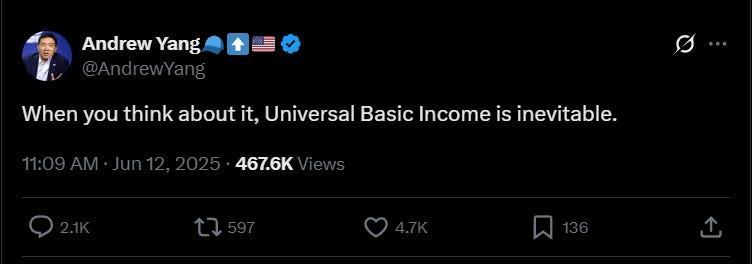Universal Basic Income
Ethical Only if Voluntary
The idea of a Universal Basic Income (UBI) is deeply appealing, promising to alleviate poverty, provide a social safety net, and offer individuals greater freedom to pursue meaningful endeavors. However, while these goals are admirable, the ethical integrity of UBI hinges entirely on how it is funded.
The Ethical Foundation: Voluntarism
A UBI funded entirely through voluntary contributions—donations, mutual aid societies, charitable foundations—embodies genuine compassion. Participants freely choose to support others, motivated by genuine empathy or enlightened self-interest. This model respects individual agency and aligns perfectly with principles of voluntary interaction.
Coercion Undermines Morality
In contrast, a UBI funded through taxation or inflationary monetary policy (money-printing) inherently involves coercion. Taxation is not voluntary; it is enforced by credible threats of harm (fines, imprisonment). Even if the goal of redistribution is noble, coercion transforms altruism into compulsion, undermining the very ethical foundation it purports to uphold.
Why Coercion Invalidates UBI
From an ethical standpoint rooted in agency, coercion that violates individual rights or autonomy is always harmful. Harm, defined explicitly as the credible threat of actual damage to one's agency or well-being, diminishes autonomy and freedom. A coercive UBI thus paradoxically reduces societal agency even as it seeks to expand economic opportunity.
UBI Must Stand or Fall on Voluntary Support
If UBI cannot be funded voluntarily, it indicates that the collective valuation of this idea—measured through willingness to contribute—is insufficient. This fact alone demonstrates a misalignment between social preference and resource allocation, suggesting that coercive implementation would impose values that society, collectively, does not truly prioritize.
The Path Forward
A voluntary UBI, supported by genuine community commitment, charitable giving, and voluntary insurance or mutual aid mechanisms, remains fully ethical and desirable. By contrast, a coercively funded UBI, no matter its noble intentions, violates fundamental ethical principles and ultimately fails the test of voluntary cooperation.
In short, if UBI cannot thrive voluntarily, it should not be pursued at all.




Possible cross over https://open.substack.com/pub/oswald67/p/a-saving-grace-from-the-ai-tsunami?r=2r3au&utm_campaign=post&utm_medium=web&showWelcomeOnShare=false